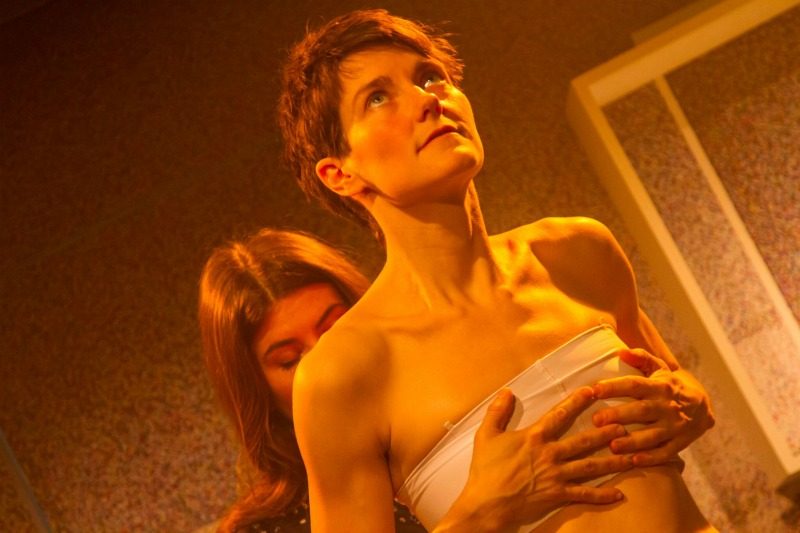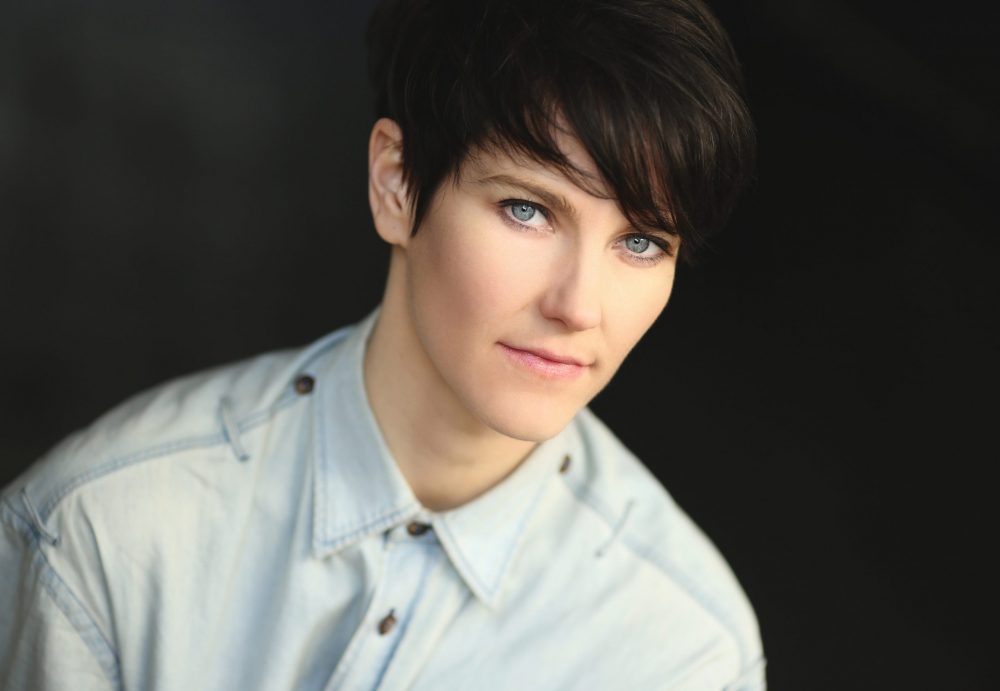The out actor stuns onstage playing a lesbian who transitions.
Rotterdam, a new, award-winning play by Jon Brittain is now playing in New York City after a critically-acclaimed, sell-out run at London’s Theatre503 in 2015, and Traflagar Studios in 2016. It’s a welcome continuation of lesbian-themed productions on and off Broadway, including the hits Fun Home and Indecent, which deal with powerful and intersectional LGBTQ themes.
Rotterdam is forceful in its focus on a lesbian couple who are literally in transition: Alice wants to finally come out to her parents as a lesbian. Her girlfriend Fiona (who identifies as a male, Adrian) wants to start living as a man. Now, as Fiona/Adrian begins their transition, Alice must face a question she never thought she’d ask: does this mean she’s straight? This drama/comedy raises issues pertinent to our community, and to find out more we caught up with the show’s lead, Anna Martine Freeman.
Rotterdam is about a lesbian couple, one of whom reveals he’s not a lesbian but rather transgender. This is becoming more common in lesbian lives. Have you had any experience with is yourself?
Perhaps transgender issues are becoming more visible in lesbian communities, but I don’t thinks it’s anything new. Trans people have been around for as long as anyone else and it’s when we find the vocabulary to talk about these specific issues that people become more aware of them. When you don’t have a role model or someone visible in your life to put words and understanding to the feelings you’re experiencing, it’s very challenging to find your way or know what to do next let alone dare to come out. That’s why it’s vital that we support trans visibility, that we write and include trans narratives and see trans people and gender non-binary people in our everyday life so that we can normalize these stories and lives and make that challenging journey that little less painful for the person who is questioning and searching for their identity.
One of the most rewarding experiences doing this play has been hearing the most wonderful coming out stories, I have had people come up to me after the show from across the board telling me how moved and connected they were to the play, this included people within the LGBTQI community, as well as people who were less acquainted with these worlds or issues.
I think that’s partly to do with the fact that although it deals with complex issues around gender and sexuality, it is very inclusive and there are different access points into the play through the four very different characters and with its humor it reaches out beyond these labels and specific identities and connects with the audience on very human levels.
In the past year, at least three mainstage plays have dealt with lesbian themes. Do you see this as a growing trend?
Finally! I think that there has been a surge in female-led narratives; I mean you can only watch men dominating the conversation and saving the world so many times. Other voices are finally starting to be heard and that includes women. So yes, I think we should celebrate the fact that we are seeing more lesbian characters in our theatres and on our screens, but there is still a long way to go before that becomes the norm. I look forward to seeing LGBTQI characters included in storylines where they don’t just perpetually play out their identities — they just simply exist and get on with it.
Alice, and Fiona/Adrian, have been acclaimed by critics as believable characters. The play is written by a man, Jon Brittain. In this era of identity politics where some people assume that one can only write from one’s own gender and racial subject position, what do you have to say about this?
I think that’s a really interesting question. Straight cis white able-bodied men have been running the show for long enough! Jill Soloway suggested in her brilliant talk at TIFF last year on the female gaze “for there to be actual gender parity in the gaze, we would need the next 100 years of almost every single movie to be produced, written and directed by women” so cis males “stop making things.” However, sometimes to make changes I think we also need those people who already hold a platform to acknowledge their privilege and to use it respectfully for progress, to open up that platform for other people and to recognize what spaces they are taking up. When the play’s over or the credits role, these issues don’t disappear. I think it’s also about what you do afterwards and continue to do to support, in this case, the LGBTQI community. But the structure of the writing of the play is very familiar to audiences: it’s like a sit-com and it has a familiar dramatic journey that is easy to get on board with from the get go. Its humor is what really breaks down those tropes and cliches we often see in mainstream LGBTQI storylines.
This play connects to people because and despite it being a ‘queer play’! It is both enjoyable and welcoming to new-comers who might not be used to engaging with these issues but it’s also joyfully familiar and better connected to the LGBTQI community than I’ve experienced on stage before.
 In playing Fiona/Adrian, how did you build the character and the role?
In playing Fiona/Adrian, how did you build the character and the role?
It’s been challenging and liberating exploring Fiona/Adrian! He’s a brilliant character—this witty, scathing but decent guy who is on this edge of an epic change. He’s taught me a lot along the way, especially about finding the courage to speak your truth. He’s also opened my eyes to how gendered we are as a society, like how our behavior is prescribed to us by our assigned genders—and that’s one of the challenges Adrian comes up against in the play—he is at the beginning of his transition and gets misgendered all the time. In a similar way that sexism and misogyny undermines and marginalizes women, being misgendered or denied the right to self identify is damaging and alienating to that person. So Adrian is hurt and frustrated because he is presenting as a man but doesn’t understand why people still choose to ‘treat him like a woman’.
In terms of method, for me personally I feel that each character and world requires a bespoke approach, of course I’ve done a lot of research and have spoken to trans people within my community and reached out to groups like Gendered Intelligence. There is such a strong supportive online community too which has been great.
Fiona/Adrian is a very physical character, not just in terms of the physical effects of the hormones he takes in act two, which of course is part of that work; the voice and body changes with testosterone, but his emotional journey is epic! So physical training has been a big part of my preparation, running and Pilates mainly, to be able to sustain his journey, then to repeat it again night after night.
How do you personally identify, and have you received any criticism from trans people for playing Fiona/Adrian?
To be honest this play has been received so warmly across the board. I have a deep empathy and connection with my character and the issues in the play are aligned with what I care deeply about on a personal level. I identify as queer and I’m so proud to be part of a play that stands so strongly in solidarity with the LGBTQI community, where you cannot help but empathize and root for these brilliant characters who above all, are only human. It’s definitely a debate that needs to be had. I know that the producers and creative team did audition many cis and trans actors through personal contacts and by working with Gendered Intelligence, and the Gendered Intelligence trans-acting group. It’s always important that castings give full opportunity to all actors.
In the case of Rotterdam, the biggest challenge was finding someone who could act out the chronological progression of the script. In the end, I understand that the choice was based on who could best serve the character and represent Fiona/Adrian pre-transition in the first act and Adrian four months down the line in the second act. This is the first production of this play, but it would be great to see multiple ways of casting it in the future when it is taken further around the UK or World.
What are you most enjoying about the New York run?
Pickle-backs in the bar after the show.
